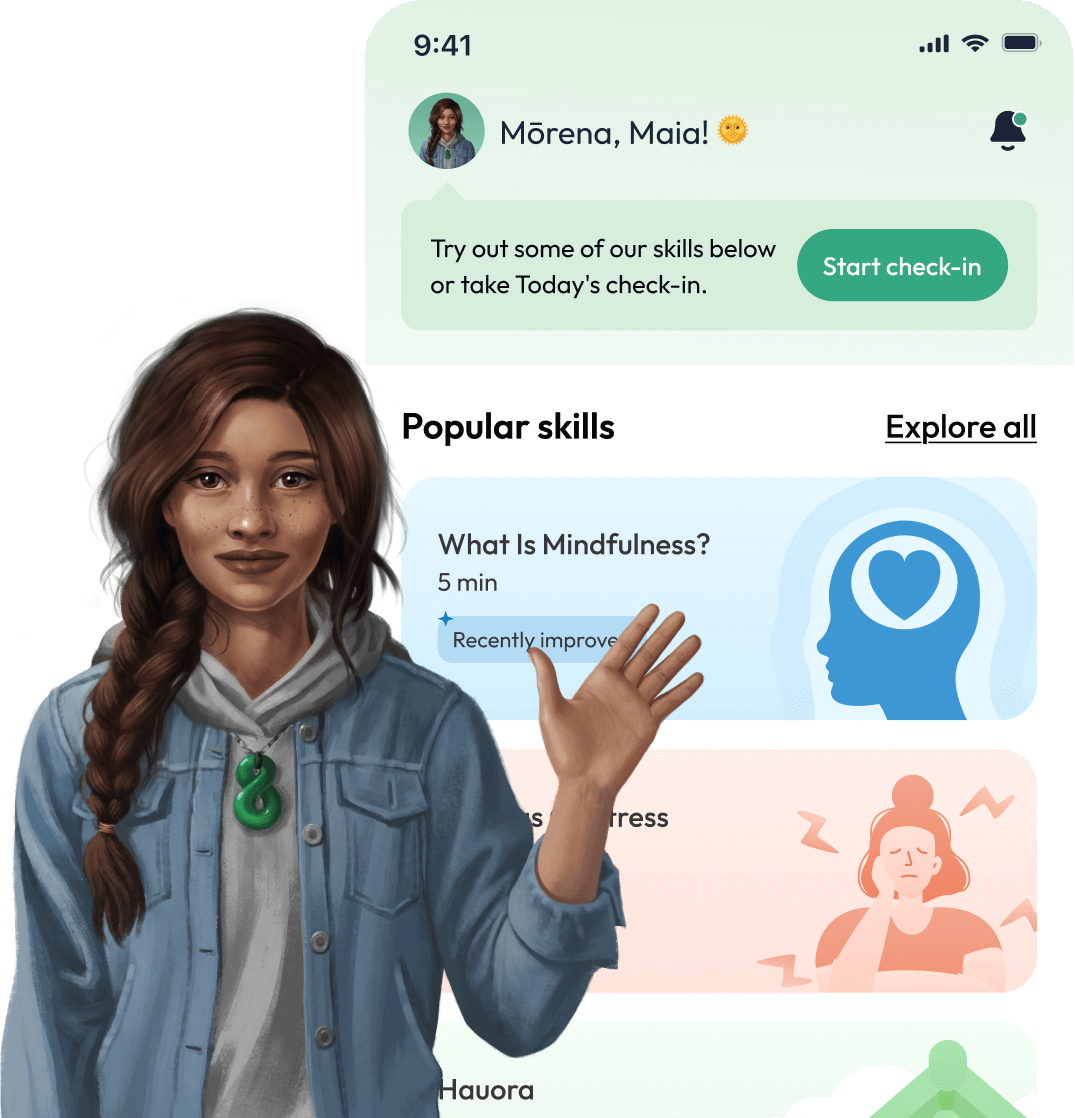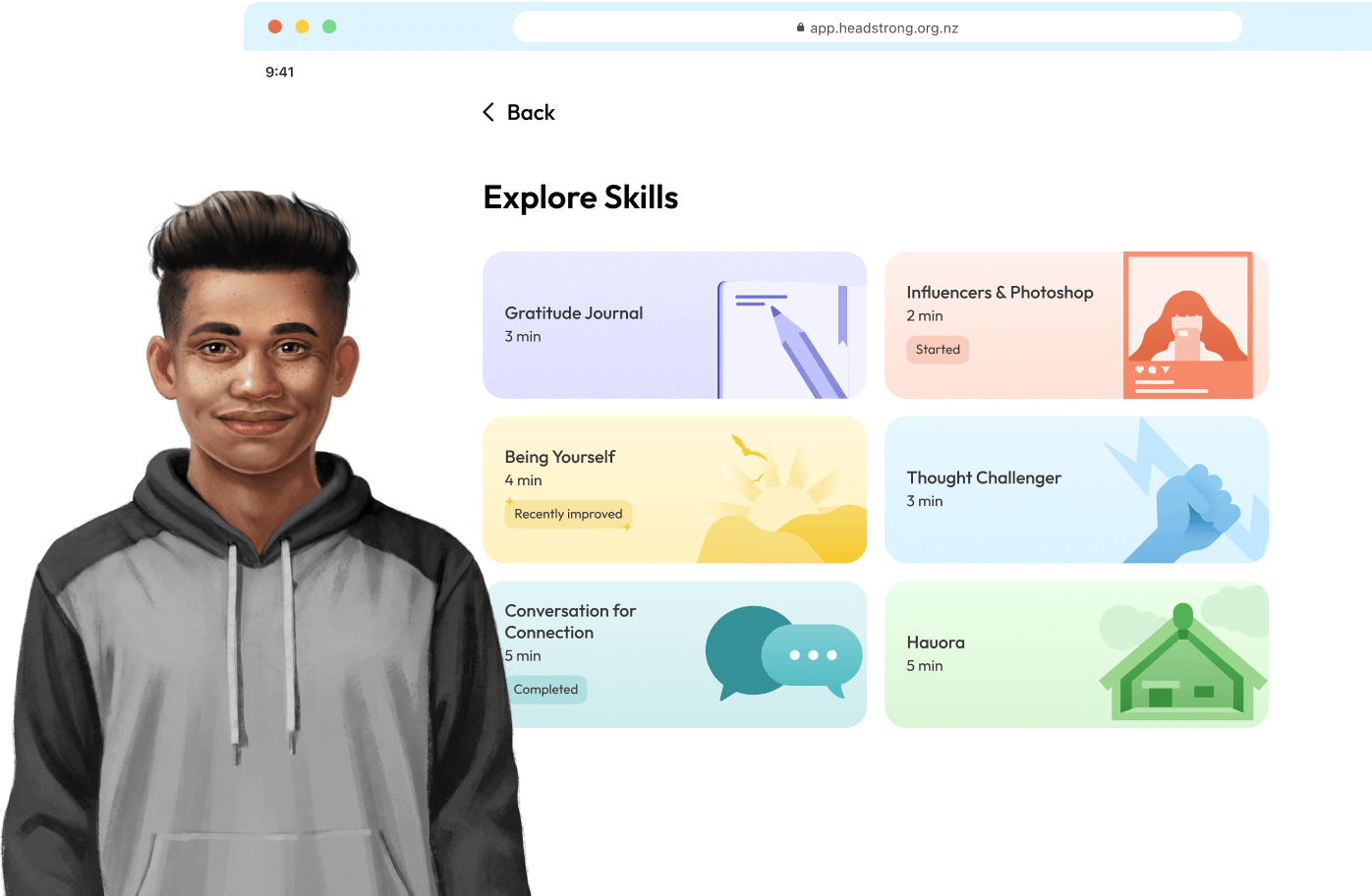Download the app for free today!
Headstrong is a free, science-backed app delivering support and psychoeducation based on cognitive behavioural therapy, positive psychology, mindfulness, interpersonal skills, and harm-minimisation strategies.

So how does it work?
Developed by mental health and digital experts at the University of Auckland, in consultation with rangatahi, Headstrong is an always-accessible tool that helps young people develop inner resources to thrive.
Complete your daily check-in
Answer a few simple questions, and let the app suggest a skill for you. You can do as many or as few skills per day as you like.
Learn skills to help you and your wellbeing
Explore a range of skills, each teaching you something new for optimal hauora in a straightforward, conversational way.
Unlock your potential
Earn badges as you build healthy habits—learn coping skills, feel happier, handle stress better, and improve your relationships.
Benefits backed by science
Developed with rangatahi & digital experts at the University of Auckland. The content draws on culturally responsive and evidence-based strategies.
Cognitive Behavioural Therapy (CBT)
Identify and change negative thought patterns, improve emotional regulation and engage in healthier behaviours.
Te Whare Tapa Whā
Support for your mind and body, your connections with whānau and friends, & your spirit or beliefs. All these parts need to be strong and balanced for you to feel your best!
Positive Psychology
Leveraging rangatahi's inherent strengths to foster optimism, gratitude, and a positive outlook on life.
Relaxation & Mindfulness
Boost self-awareness, align actions with values, enhance self-esteem, and assist with better sleep.
Interpersonal Skills & Communication
Learn how to handle complex relationship dynamics, develop meaningful & genuine connections.
Substance Use & Harm Minimisation
Guidance for safer choices and behaviour changes, with the aim of empowering teens to prioritise their safety and wellbeing.
No phone?
No worries!
Headstrong also has a desktop app created to empower rangatahi with evidence-based tools, to help prioritise well-being.

Got questions?
If your questions aren’t answered here, feel free to send us a message!
Absolutely! Headstrong is 100% free, thanks to funding from Health New Zealand Te Whatu Ora. That means there are no subscriptions or in-app purchases to worry about.
If you ever have thoughts about harming yourself or others, it's crucial to reach out to someone who understands and is trained to help.
For immediate crisis support and helplines, please visit the Mental Health.org website.
If you or someone else might be unsafe right now, dial 111.
For urgent mental health support, contact the nearest Crisis Assessment Team to you here.
If you're seeking mental health resources, you can find them on our Get Help Now page.
If you need to talk to someone else:
Free call or text 1737 for support from a trained counsellor.
Lifeline:
0800 543 354 Free text 4357 (HELP)
Youthline:
0800 376 633 Free text 234
Samaritans:
0800 726 666
Headstrong has been developed by a team of experts in youth mental health from the University of Auckland, working alongside rangatahi (young people). Our content is based on proven strategies to strengthen mental health and build resilience. It is grounded in a holistic wellbeing model called Te Whare Tapa Whā.
Download the Headstrong app for iPhone or Android (or access the desktop version) and start using it regularly. Just like working out regularly makes your body stronger, routinely practising self-care skills with Headstrong will strengthen your mental wellness and emotional wellbeing. Starting as a beginner, you'll form healthy habits and notice the difference over time—learning coping skills, feeling happier, handling stress better, and having improved relationships.
Remember, we have a huge range of different skills and you can try as many as you want. As part of our goal to be the best mental health app for rangatahi, we are constantly adding new features so keep checking your app for these.
Headstrong uses evidence-based and culturally responsive psychological and psychotherapy strategies to help you strengthen your mental health, be more resilient, relieve your stress, have better relationships, and more. The skills are based on:
- Cognitive behavioural therapy (CBT): How to understand and change negative thoughts and behaviours to feel better
- Positive psychology: How to enhance your positive emotions, grow your strengths, and keep a grateful mindset
- Mindfulness: How to stay calm and in the moment to feel more at peace – like deep breathing and other breathing exercises
- Interpersonal skills: How to get along with others, communicate better, and build strong relationships with friends and family
- Harm-minimisation strategies: How to stay safe around drugs and alcohol and other addictive things
These strategies are commonly used by counsellors and psychologists because research shows they work effectively for most people.
No, our guides are not real people. They are virtual chatbots that deliver content through short conversations/kōrero based on predefined rules and scripts written by our team of youth mental experts. The way we use generative artificial intelligence (GenAI) (like ChatGPT) is limited, so the chatbot can’t come up with its own original content.
You can choose your own guide from a selection that represents the diversity of young people in Aotearoa New Zealand. We work closely with rangatahi to ensure our guides sound relatable, engaging, and helpful.
Yes, but only to make conversations with your chatbot flow more naturally. AI is not permitted to provide mental health advice in the app and does not replace the mental health content created by our team of experts. We do not use user data to train our AI model.
If you want to know more about how we use AI and how we keep your data safe while doing so, check out our AI Statement.
We're constantly working to enhance the Headstrong app, incorporating the latest research, data, and feedback to improve all aspects of the user experience. Stay tuned and check-in on your email to find out when new content is added or updated. If you have any feedback, please get in touch with us at contact@headstrong.org.nz.
We're always eager to improve the Headstrong app further. Please send us your feedback at contact@headstrong.org.nz.
We share our findings in scientific journals. You can read more about this on our Research publications page.


